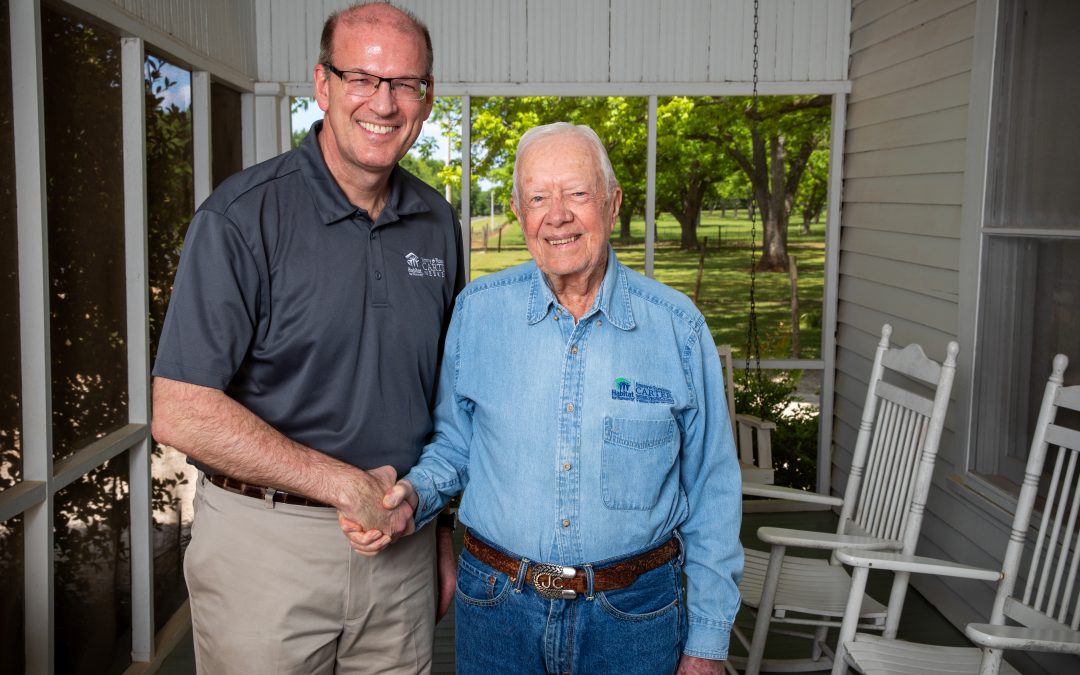President Jimmy Carter with Jonathan Reckford, CEO of Habitat for Humanity
The web is teeming with advice about what I can do to learn who I truly am. Knowing myself, I’m told, is an important step to achieving greater joy and inner peace. Long ago, the ancient Greeks told us Nosce te ipsum — know thyself.
Finding Myself by Focusing on Me
Here are some of the most common ways I’m told I can get to know myself:
I can take personality tests, which would show me, for example, that I’m an ENTJ on the Myers-Briggs Indicator, and an ‘8’ on the Enneagram — that’s the Enneagram type people most love to hate, by the way!
Alternatively, I can get to know what’s important to me, for example, by asking the ‘Five Why’s’ to get to my most fundamental values. Mine are likely to include growth and learning.
Or I could get even more analytical and conduct a SWOT analysis for my life (Strengths-Weaknesses-Opportunities-Threats). This allows me to identify what I’m really good at and where my greatest opportunities lie.
These are all good and useful tools for self-discovery. And it makes sense that such exercises in self-awareness would focus my attention on me, right? My personality, my values, my strengths.
Finding Myself by Focusing on Others
I am beginning to learn that a focus on me gets me only partly down the path of knowing who I truly am. Is it possible that, paradoxically, a focus on others might better lead me to my truest self?
Many of us have heard Mahatma Gandhi’s words, “The best way to find yourself is to lose yourself in the service of others.” But until recently, I had not thought a lot about what this really means. I’m about to launch my third podcast season, which asks, How Can Acts of Service Be a Path to Finding Your Truest Self? Here’s a sneak preview of how some of my esteemed guests think about the role of service in finding ourselves.
This from Jonathan Reckford, CEO of Habitat for Humanity International:
“Habitat for Humanity is a perpetual motion miracle. Everyone who gives receives and everyone who receives gives. If you want to stay complacent and uninspired, stay away from Habitat. Come close to Habitat and it will change you and make you a part of changing the world. I love that image because I think at heart that’s what service really is all about.”
And this from Shawn Askinosie, the founder of Askinosie Chocolate, which was named by Forbes as one of the 25 best small companies in America. And Shawn was named by Oprah as one of 15 guys who are saving the world:
“We can experience unbelievable transformation and an acceleration of this notion of becoming and connecting to our true self, if we’re willing to explore our own broken heart, and then serve someone that we know who might need us out of that place in our own broken heart.”
In fact, service is usually defined as something that a person does for someone else, or in the case of John R. Lewis and John R. Schmidt — whom I wrote about in a recent blog — does something for the world at large. But it turns out that service may be one of the few win-win acts in life that benefits me as much as, or even more than those I am serving.
The Attitude of Service Matters
Service is much more than action. Speaking with my guests on the upcoming podcast has encouraged me to think about service as both attitude and action. And attitude may be the more important of the two in revealing who I truly am! Service will be the win-win act I described only if I show up with the right attitude.
One of my podcast guests is Apricot Irving, award winning author of The Gospel of Trees, who grew up as a missionary’s daughter in Haiti. While she applauds the good intentions of those who serve, she also compassionately and honestly exposes the too-often unspoken condescending underbelly of service and good works:
“We centered ourselves as the heroes of the story in our newsletters, in the stories we told to our supporters back in the States, as if it was our destiny to save Haiti. And I really deeply believe now and understand that in a place like Haiti, any community, it doesn’t need a rescue mission. It needs respect, collaboration, what can we learn from each other.”
The indigenous Australian artist and activist Lilla Watson said it so well: “If you have come to help me, then you are wasting your time. But if you have come because your liberation is bound up in mine, then let us work together.”
So, let’s work together to make this a better world as we find our truest selves.


Marlena says that service will be a win-win act only if I show up with the right attitude. This wisdom takes me back to my long-deceased father who has come to be so much smarter as I have aged. For example, he often told me that everyone has something to teach you if you will simply listen and watch. His voice joyfully resonates within me today after reading this blog.